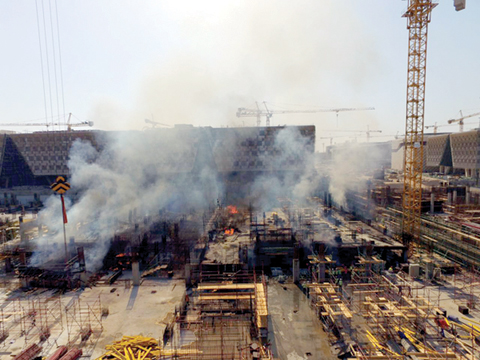RAFAH: It took Palestinian woman Umm Imad three days to reach Rafah, braving rain and cold weather in hopes of reaching safety as fighting rages across the besieged Gaza Strip. But in the border town, on the Palestinian territory’s southern edge, the 70-year-old was forced to sleep rough like hundreds of thousands of other Palestinians displaced by Zionist war on Gaza, now in its fourth month. “I didn’t find shelter, I didn’t find a tent, I didn’t find anything”, said Umm Imad, her black headscarf ruffling in the wind.
Heavy rains in recent days have given way to the return of a blue sky over the coastal strip, but the cold remains. Rows of tents stretch into the distance behind Umm Imad, now a common sight all over Rafah. Some of the tents are pitched along a hill of sandy earth, crisscrossed by barbed wire fences several meters (yards) high.
Many of the displaced Palestinians in Rafah have travelled there from Khan Yunis, southern Gaza’s main city about seven kilometers (four miles) to the north which has become the epicenter of the Zionist military’s offensive. “I spend the night in the street, under pouring rain, without shelter or anything, and I have orphaned children with me,” Umm Imad said.

Holding back tears, Abdallah Halas, 24, said: “I don’t know where we will go and sleep. Children, women, elderly and sick family members are in the streets.” Nearby, streams of waste water flow through the streets littered with rubbish.
According to the United Nations, 1.3 million people — more than half of Gaza’s population of 2.4 million — are now trapped in Rafah, crammed together in “desperate conditions”. On the 113th day of the war, Palestinians continue to move from one area of Gaza to another, fleeing the Zionist invasion that began in the north before moving steadily south. They move by foot, on donkey carts or crammed into the backs of diesel-powered trucks — a costly option with hardly any fuel left in Gaza.
The Zionist entity’s relentless ground and air military campaign has killed more than 26,257 people, around 70 percent of them women, children and adolescents, according to figures from Gaza’s health ministry. The entity claims the bombardment is aimed at destroying Hamas after the Palestinian resistance group attacked southern Zionist communities and military bases on Oct 7, 2023. Around 1,140 people, mostly civilians, died in the attack and subsequent Zionist military operation aimed at regaining control of communities targeted by Hamas.
‘Nothing left in Gaza’
In Rafah, drivers must go at walking speed as they make their way on the overcrowded streets. Road-side vendors sell basic supplies: canned goods, mattresses, blankets and tents. Similar items are being delivered into Gaza in humanitarian aid shipments, but these have slowed to a trickle since the war erupted. A bag of potato chips costs eight shekels ($2) — an eight-fold increase from its pre-war price.
Hind Ahmed, 29, waited with her three children on a busy street in west Rafah, hoping to find a taxi or a donkey cart that would take her to her husband at a makeshift camp. “We were staying in a school classroom for over a month ... We shared the classroom with over 50 people, the air was polluted and the school is overcrowded”, she said. “So we decided to go live in a tent despite the cold weather,” Ahmed said, her youngest son in one arm, a sponge mattress and a bag of clothes in the other.
The family has been displaced several times and their situation has become “illogical”, she said. “Open the crossings and let us leave, there is nothing left in Gaza, no schools, no education, no basic life necessities.” A man crossing the street interrupted, angrily shouting: “We will not leave Gaza. The (Zionists) are the ones who came to us, they are the ones who must leave.” — AFP











